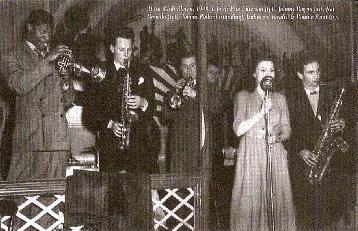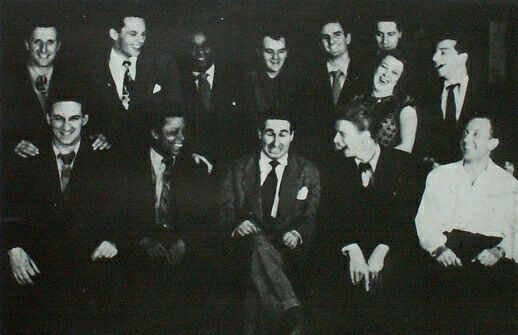










          |
| The musicians - Club 11 (1948 - 1950)... |
 |
|
Most of these comments on the development of Mac's Rehearsal Rooms into the legendary Club 11 have been adapted from the book "Jazz at Ronnie Scott's" by Kitty Grime, published in 1979 by Robert Hale... Don Rendell "It was a rough place - a kind of old ramshackle sort of bare room with lightbulbs. The big room right at the back had some old settees, very dingy. There was no effort to beautify the place, none. It was entirely the music that filled it. Some nights it really did fill it. The interest in jazz was growing, but the point was, it was the in place. It was the hip place. There was a dance floor". "Those days were shrouded, almost completely enveloped in a marijuana haze. No wonder no one can remember them". "It was quite a closed circle that we had at the Club Eleven. I have the feeling that not everyone was very popular if they got up and tried to join in. Just those whose gig it was did the playing with very few exceptions. But the people didn't seem baffled at all by the new music we were playing. It seemed to be so obviously right. What we were hearing on record from Parker, Gillespie, the early Miles Davis, tenor players like Wardell Gray, Dexter Gordon, Stan Getz and Allan Eager - we just fell naturally into it. And the audiences just lapped it up". John Dankworth "Club 11 was an indirect result of Ronnie (Scott) and me and all the rest of us coming off the boats full of this music, (bebop heard in New York in the late 1940s while working as musicians on the cruise liners),and wanting to try it out on someone. Mac's was handy because it was at the end of Archer Street, which meant you could play and then pop out and see if there were any gigs". "Archer Street is a myth in many ways. So many people went down there every Monday to get gigs, but so few ever got them. It really was a meeting place. I think the idea (of the club) came from Harry Morris who new Ronnie very well. We used to file past Harry to get whatever division of funds there was". Coleridge Goode "On the whole black and white musicians were separated. Just odd players sat in from each side. There was always a certain jazz feeling in black clubs which was different from the white places. And the atmosphere was more jazz orientated. It was the bebop tradition to freeze out strangers. It was their tradition! I think it stemmed from hearing that Parker would turn his back. So it was, wear shades and turn your back and shut yourself off from the people. And just play". "You're not welcoming, are you? It was as if you had to smoke pot and dabble with the other things to get into that circle. Or - no chance! I have no part of that at all! Music is something to be shared with people, not to put people off with". "You really had to be a good instrumentalist to play that music and have an advanced knowledge of chord structures. So I suppose it gave you a feeling of being exclusive, being able to do that. They got used to alienating themselves from people. And now it shows. Funny". Tony Crombie "Club 11 had it's nights. It worked for a while. There was music going on all day from two in the afternoon, guys would start showing up, creeping down there, "Let's try this number". It was all rehearsal really, even the sessions". "Laurie (Morgan) came back, (from New York), like, rounded off, completely into the bebop idiom as if he'd been playing that way all his life. He was the first actual authentic bebop drummer in Britain". Bill Le Sage "I remember in those days the bands would play one number for forty minutes. Then take a ten minute break while they tried to think of the next tune to play". |
"The musicians played what they liked as they liked - but it was mostly bebop and a lot more frantic than at Feldman's. There was no requests and no programme. If the music failed to please...well you didn't have to stay. But there were hundreds like myself who liked the music. So we stayed while some left. And the more we stayed the more the Club 11 crept into the marrow of our bones..." Raymond Thorp: Viper (WDL Books, London 1960).  Ronnie Scott
Ronnie Scott"Odd faces used to come down (to Mac's) and listen - jam sessions, that's what they were. So we thought we'd do it one night a week and charge people to come in, see if we could make some bread. And it went from there. We put on a couple of concerts, Carlo recorded it, then it ended up six nights a week". "Then it got raided. It was the first drug raid we'd ever had. It was suddenly.....criminal. I mean that club was open house. It was ours! Used to go there any time of the day or night, stay all night, lock the doors, and we were in there and all sorts of things used to go on - oh, incredible things". "There was an intrigue that involved Tommy Pollard, very good player, ended up a terrible junkie, and arguments he'd had with one of the guys. There are various theories about what happened but the probability is that... somebody.... had told the police. Out of spite. They found me with a little tiny packet of cocaine. That was very rare, cocaine. Maybe I just got lucky. I told them I had it for my toothache. We spent the night in Savile Row police station". "Then - fined twelve pounds, fined fifteen pounds, and so on. And that was the collapse of the club, the collapse of it. Laurie Morgan "The name was Tommy Pollard's idea. Cravats were the thing in America at that time - the jazz bow, you know - polka dots. Anyway we had six red ones and four blue ones, on bits of elastic so you could just pop it over your head, no bother. So it took off - the rest is history". "The musicians, while they could play their instruments, had nothing else to offer. They didn't sell themselves to the public, called the audience peasants. They didn't try, they didn't attempt any atmosphere, mood making, that was the last thing they wanted. They'd just blow away, get lost in their own little world. People looking at it might think, well, it's all right for small clubs, and Coca Cola, but you couldn't put this on stage. There wasn't anybody in England as far as managing was concerned - alert, wise, concerned to know how to channel this music, how to present it". Very few of us were schooled musicians, and yet we learned how to play and reached standards which took some effort and talent - even though we were imitating. Looking back on the jam sessions, it either became a dynamo of energy which drove along and excited prople, or it was insecure and wishy-washy. I never knew times when someone would play, say, a beautiful melodic ballad. There was no romance in it. And it didn't swing. It drove. And it was never relaxed simply because the musicians daren't stop to listen to each other". "I knew that I needed to be a member of a group of guys who were going to dedicate their lives to producing great music for the best possible reasons, with the greatest friendliness and support, to pick each other up, to reassure each other. But unfortunately that didn't happen. I just left it, and once you leave a thing like that, once you cut out, the doors slam behind you. I didn't want to know. Denis (Rose) quit too. He thought it was all childish. As the elder statesman, he always thought we were silly, getting stoned out of our minds thinking we were God". Ronnie Scott... Don Rendell... Coleridge Goode... Laurie Morgan... |
 A Club 11 photo showing most of the original members and some friends...
A Club 11 photo showing most of the original members and some friends...Left to right rear: Joe Muddel John Dankworth Duke Diamond Tommy Pollard Ronnie Scott Laurie Morgan (Marie Benson in front) Harry Morris Front row: Tony Crombie Ginger Johnson Flash Winston Lennie Bush (Unknown) The music of Club 11 was recorded on one night in 1949 at a live concert (details...) and is currently available on various CDs... | |